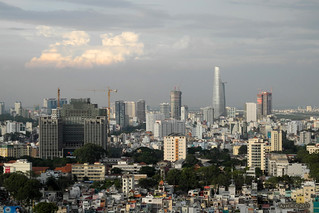Saigon, an exotic trading post of bygone times, derived its name from the banks of the river upon which it is located. In 1859, the French arrived and transformed it into the capital of French colonial Indochina. With nearly 6 million inhabitants, Saigon is also known as Ho Chi Minh City and, although large, is no longer the capital of Vietnam. Following the eventual withdrawal of both the French and the Americans, the city has prospered once again with a lively trading spirit and a special flair that has helped it to become known as, The Paris of the East.
The Post Office, a mighty colonial building of 1883, highlights the splendor of old Europe and with its colorful glass windows, cast iron gratings and balustrades, it is more like a European train station. The History Museum was built in 1929 according to Neo-Vietnamese design and features a large range of fascinating exhibits from each epoch of the country’s history. Statues, pottery and other artifacts of various epochs are on display in various atmospheric rooms and they range from the Bronze Age culture of the Dong Son to the Funan, Chenla, Khmer and Cham periods as well as various Vietnamese dynasties.
Although past, present and future live side-by-side in this richly cosmopolitan city, today Saigon is experiencing a massive property boom and its city centre premiums now match those of both Singapore and Jakarta.
Saigon’s dramatic past began with it being a small fishing village followed by its development as the ‘Paris of the East’ and then as an American garrison city until it eventually became South Vietnam’s modern metropolis of today.








